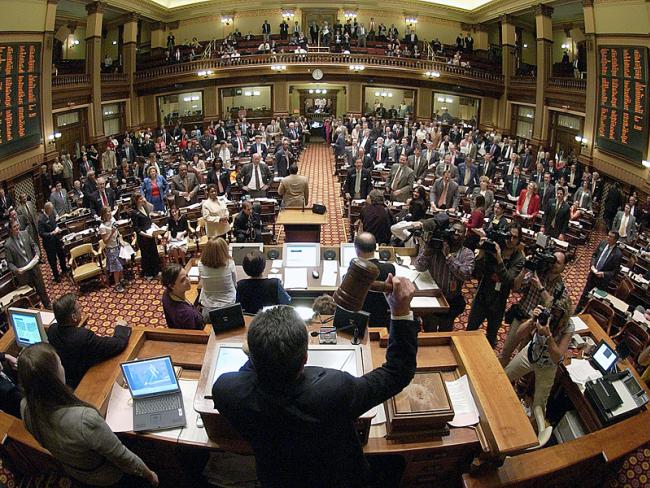By: Quinn Rogness

The votes are in, and the 2013 CPAC straw poll winner is Sen. Rand Paul, R-Ky. Paul’s victory over other Republican favorites such as Marco Rubio, Rick Santorum, and Chris Christie comes just over a week after his 13-hour-long filibuster in opposition to the nomination of John Brennan as director of the CIA. The junior senator from Kentucky has recently been quoted as saying he’d like to be more involved in the national debate, indicating that he is considering a run for the presidency in 2016. A self-described “Constitutional Conservative,” Paul seems to be attempting to bring together Libertarian-Republicans, Tea Party Conservatives, and Mainstream Republicans in one movement. Paul is certainly making an effort to be noticed on the national stage, and his across-the-board conservative appeal renders him an enigma and a politician worth further investigation.
Elected as Kentucky’s junior senator in 2010, Rand Paul had been living in the shadow of Republican favorites such as Marco Rubio, Chris Christie, and his father Ron Paul until March 6, 2013, when he launched a 13-hour-long talking filibuster in opposition to CIA director nominee John Brennan. Paul’s marathon filibuster was an attempt to clarify with the White House whether they believed it was constitutional for the government to target an American citizen on American soil for terrorism without giving that citizen due process. During his speech, many other senators aided him by asking him questions, including Marco Rubio, R-Fla., Mike Lee, R-Utah, Ron Wyden, D-Ore., and Ted Cruz, R-Texas. Paul finally ended his filibuster after midnight on March 7, making it the Senate’s ninth-longest filibuster in history. Many say that this moment made Rand Paul as a household, national name in American politics, and could serve as a launching pad for a presidential campaign in 2016. The most interesting aspect of Paul’s filibuster is that in this particular instance, he is burning a lot of bridges with certain mainstream Republicans while ingratiating himself with many of his father’s supporters who are strongly concerned with civil liberties and privacy-issues. In addition to his concerns with drones, torture, and civil liberties, Rand Paul has also called for cuts in defense spending, which distances him from his Republican colleagues and appeals to his father’s Libertarian support base when it comes to national defense-related issues.
While agreeing with his father on many issues, Rand Paul seems to be attempting to forge his own identity within the Republican Party and to appeal to a broader range of people than his father did. When the Republican Party filibustered Chuck Hagel’s nomination as Secretary of Defense, Rand Paul joined with the majority of his party, despite the fact that Hagel and Paul agree on many military issues. Paul’s filibuster shows his political expedience, and his willingness to please his party just enough not to alienate it, which will increase his chances of gaining support from mainstream Republicans and party leadership on both legislative issues, as well as in a potential presidential campaign. Paul has also identified with grassroots conservatives and the Tea Party Movement, notably delivering the Tea Party’s response to the State of the Union in 2013. When it comes to the national debt and spending, Paul consistently agrees with the Tea Party and has introduced his own sequestration bill, cutting more government spending than other mainstream Republicans have proposed. Despite disagreeing with many mainstream Republicans and Tea Party Conservatives on certain issues such as defense spending and privacy issues, Paul maintains strong ties with the larger political establishment that will serve him well if he seeks to develop greater political power in Washington.
Breaking with almost all other right-wingers, Paul has recently announced his support for a pathway to citizenship for illegal immigrants. For a member of a party that has staunchly opposed illegal immigration and has generally been against any type of pathway to citizenship, this is an incredibly bold stance. It would appear that Paul is aiming to expand the Republican Party’s appeal beyond its current base and to improve its support among Hispanic-voters, a voting group that is becoming increasingly important in presidential elections. Paul has argued that the GOP should take a more libertarian approach to social issues in order to be competitive on the West Coast and in New England, which is currently a Democratic stronghold. It would appear that Rand Paul is not just trying to appeal to all different types of Republicans, but also to expand the party and grow its base.
Senator Rand Paul has proven that he has no problems with breaking the Republican mold. While not holding the same views as his father, Paul has shown the same independent streak and the willingness to stand alone on an issue that he feels passionately about. On the other hand, Paul has been able to make friends in the establishment wing of the GOP and will likely go along with the rest of the party at times to avoid alienating party leadership. This will prove valuable if Paul chooses to run for president in 2016, a race during which he will likely attempt to create a coalition of Libertarians, Tea Party Conservatives, mainstream Republicans, and those outside of the Republican Party Paul could face challenges obtaining support from many Republicans due to his belief that foreign aid to Israel should be reduced, and has more passive, non-interventionist views on foreign policy. While Rand Paul’s 13 hour filibuster may be over, this certainly will not be the last we hear from him, and he will play a large role in shaping the Republican Party over the next four years.

